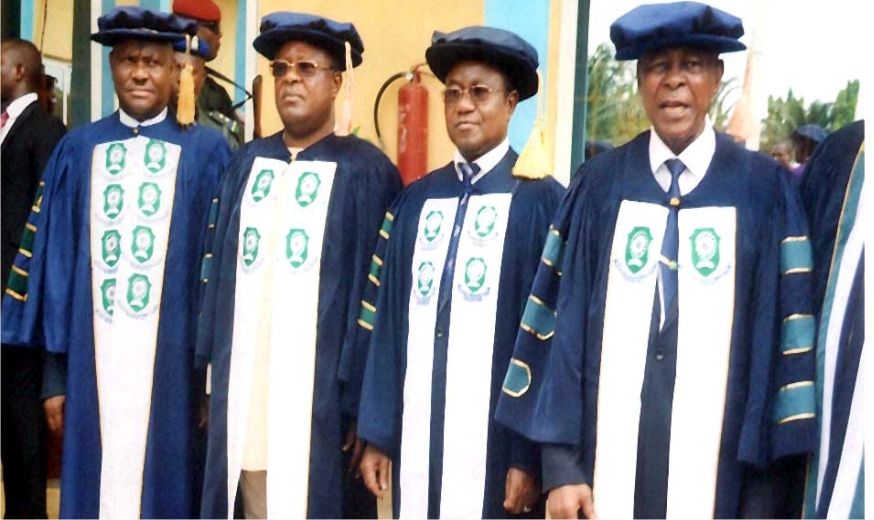Opinion
Imperative Of Health, Safety In Schools

The Department of
Educational management of the University of Port Harcourt recently hosted a conference under the aegis of Nigerian Association for Educational Administration and Planning (NAEAP) with the theme, “Management of Safety and Health for School Service Delivery: The 21st Century Imperative”.
Apart from providing a platform for presentation of papers for academic – minded fellows who are highly enthusiastic of academic excellence, it was a forum to exhaustively tackle the health and safety issues plaguing the Nigerian education system. The conference’s theme was quite timely and, a reminder to educational administrators and planners, of the place of safety and health in the management of educational assets, both human and material, as a tool to bring about the goals of education.
Indeed, we can nolonger afford to treat issues of health and safety in Nigerian schools with levity. This is because the 21st century is witnessing several winds of change, that are vigorously affecting school service delivery. From population explosion to unprecedented climatic change and terrorism, undue pressure is mounted on educational resources, amidst defined infrastructural deficits. These alterations from the original are some compelling reasons, cogent enough to restrategise on the management of safety and health for school service delivery.
The wave of terrorism in various shades and forms,according to Prof. Owoicho Akpa of Tertiary Educational Trust Fund, is a major challenge of the 21st century. That on its own, calls for a new management approach to safety and health to curb incidences of schools burning, abduction of students and teachers, as well as sporadic shooting during school hours.
The UNIPORT Chapter of NAEAP could be said to be calling for a social and physical learning environment that can be responsive to students’ needs by enabling their experiences and bringing about realistic expectations. Mich (2011) identifies such environment as conducive, which for him is ostensibly created to promote learners, safety and health.
Little wonder the wealthy in the society would always crave for such environment irrespective of the cost. I guess Surech (2002) did not mince words when he said that the quality of teaching and learning is enhanced by such environment because it is not only supportive, but also ensures the safety of learners and teachers, which Prof Akpa summarises as a learner friendly environment that promotes effective and efficient teaching for optimal learning.
Physical academic needs are met through provision of safe structure, adequate sanitary facilities, a balanced visual environment, appropriate thermal environment and sufficient shelter space, while emotional academic needs are met by creating pleasant surrounding.
Cardinally, providing students with healthy and safe learning environment where they could be protected from physical and emotional harm is central to the mission of schools. A California department of Education Publication describes a safe school as not just a place of learning equipped with advanced security procedures, but such a place that has what it takes to help students develop assets that allow them succeed even in difficult circumstances.
Aside encouraging healthy behaviours that help students learn about fitness, nutrition, and healthy choices, the concept of safety in a school, calls to mind a need for an environment where all who play one role or the other, be it students, teachers, non-teaching staff, including visitors to the school, are secured and far away from danger that could be caused by man, animal or nature.
If health could be understood to mean a state of complete physical, mental and social well being, and not merely the absence of diseases or infirmities, it therefore, follows that the due are fundamental requirements for the actualization of the goal of education. And to state that a school environment could be healthy without some measure of safety consciousness, is to say the least, a fallacy.
Suffice it to say that if a school’s state of health is adjudged good, but it is located in an insecured environment, such school should be considered wanting in its operational requirement. This situation is capable of reducing the public rating of such school, thereby drastically reducing the attendant patronage.
Sylvia ThankGod-Amadi
Opinion
Righteous Leadership Still Thrives

Opinion
Incentives: Key to Police Morale

Opinion
Time and Season Can Tell

-

 News3 days ago
News3 days agoAmend Constitution To Accommodate State Police, Tinubu Tells Senators
-

 Politics3 days ago
Politics3 days agoSenate Urges Tinubu To Sack CAC Boss
-

 News3 days ago
News3 days agoDisu Takes Over As New IGP …Declares Total War On Corruption, Impunity
-
Business3 days ago
President Tinubu Extends Raw Shea Nuts Export Ban To 2027
-
Business3 days ago
Crisis Response: EU-project Delivers New Vet. Clinic To Katsina Govt.
-
Sports3 days ago
NDG: Rivers Coach Appeal To NDDC In Talent Discovery
-
Business3 days ago
President Tinubu Approves Extension Ban On Raw Shea Nut Export
-
Rivers3 days ago
Etche Clan Urges Govt On Chieftaincy Recognition

